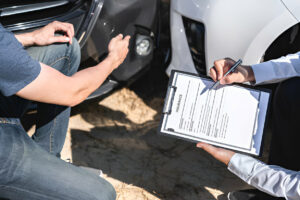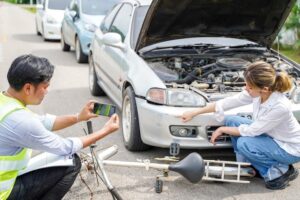Experiencing a road accident is undoubtedly stressful, but understanding the vehicle repair process can help ease some of the frustration. One of the key concerns for many individuals after an accident is knowing when their vehicle repairs will begin. Knowing the steps involved can help you make informed decisions and manage the situation more effectively.
Step 1: File Your Insurance Claim
After ensuring everyone’s safety and reporting the accident, the first step is to contact your insurance provider. It’s essential to file your claim promptly to meet all necessary timelines and requirements. Your insurer will investigate the accident’s circumstances, which includes:
- Insurance Claim Investigation: Your insurance representative will gather information, interview you, and speak to others involved. Depending on the complexity of the claim, this process may take a few days to a couple of weeks.
- Repairs Estimate: Once the investigation is underway, the insurance company will send engineers to inspect your vehicle and prepare a repair estimate. The sooner you engage with them, the faster this step can proceed.
Step 2: Choosing a Repair Shop
Once your insurance claim is in progress, you must choose a repair shop. You can either:
- Choose an Insurance-Recommended Repairer: Many insurance providers have partnerships with approved garages. Using one of these can expedite the repair process and help manage costs.
- Opt for an Independent Shop: If you have a trusted garage in mind, you can choose to go with them as long as your insurance approves them.
The garage you choose can impact how quickly repairs begin, so their availability and reputation are worth considering.
Step 3: Approving the Repair Estimate
After selecting a garage, the repair shop will inspect your vehicle and provide an estimate. This step involves:
- Thorough Assessment: The repair shop will assess the damage, determine the necessary parts, and estimate the time it will take to repair it.
- Cost Estimation: The estimate will provide a detailed breakdown of repair costs, including parts, labour, and additional charges.
Reviewing the estimate carefully is crucial to ensure you understand all costs. You may need to approve the estimate before work begins, which requires communication between you, the repair shop, and your insurance company.
Step 4: Insurance Approval of Repairs
Once you approve the repair estimate, the repair shop will send it to your insurance provider for final approval. The approval timeline can vary, but if everything matches the insurance company’s assessment, it could be granted within a day or two.
Delays in Approval Can Occur Due to:
- Disagreements over the Evaluation: If the insurance company disagrees with the repair shop’s estimate, negotiations may cause delays.
- Supplementary Claims: Sometimes, additional damage is uncovered during repairs, requiring further evaluation.
Step 5: Scheduling the Repair
Once your insurance approves the estimate, the garage can schedule repairs. However, delays can still happen due to:
- Garage Workload: Popular repair shops may have a backlog of work, leading to delays in scheduling your vehicle for repairs.
- Availability of Parts: If your vehicle requires rare or specialized parts, this could delay the repair start date.
Step 6: What to Do While Awaiting Repairs
While your vehicle is being repaired, it’s understandable to feel inconvenienced, mainly if you rely on your car for daily activities. Here are some suggestions:
- Rental Vehicle: Many insurance policies cover a rental vehicle while yours is being repaired. Check your policy to see if this is available to you.
- Stay in Contact: Regularly check in with your repair shop for updates on the repair status.
- Review Your Insurance Policy: Understanding your policy’s coverage will help you manage additional costs during the repair process.
Types of Vehicle Damage After an Accident
Vehicle damage can vary depending on the accident’s severity. Common repairs include:
- Dent & Scratch Removal
- Bumper Repair or Replacement
- Windscreen Replacement
- Mechanical Repairs
- Headlight Repairs
- Alloy Wheel Repairs
- Vehicle Paint Repairs
- Structural Repairs
- Glass and Electric Vehicle Repairs
Why Understanding the Repair Process Matters
Having a clear understanding of the repair process is vital for vehicle owners. It allows you to:
- Identify Minor Issues Early: Spot small damages before they worsen.
- Make Informed Decisions: Take control of the repair process and communicate more effectively with technicians.
- Avoid Unexpected Costs: Know the steps involved and plan for additional expenses.
Choosing Reputable Service Providers
Selecting a trusted repair provider ensures that your vehicle is in good hands. Reputable garages offer:
- Certified Technicians: Qualified professionals with extensive experience working on all vehicle types and models.
- Advanced Diagnostic Tools: Ensuring efficient and accurate repairs.
- Transparent Pricing: Clear and upfront pricing helps avoid hidden fees and is essential for maintaining warranties.
Regular visits to a reliable repair shop can also help preserve your vehicle’s performance and resale value.
Why Choose Us?
At Accident Claims Assist, we partner with a vast network of approved repairers throughout the UK. We ensure that your vehicle is repaired by skilled technicians capable of handling any damage, big or small. Our services include:
- Insurance-Approved Repair Centers
- Fully Equipped Garages
- Car and Commercial Spray Ovens
- Collection & Delivery Services
- Courtesy Vehicles
- Alloy Wheel Refurbishment
- Air Conditioning Repairs
- Wheel Alignments and Vehicle Tracking






